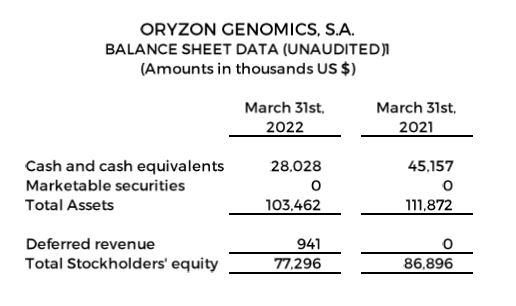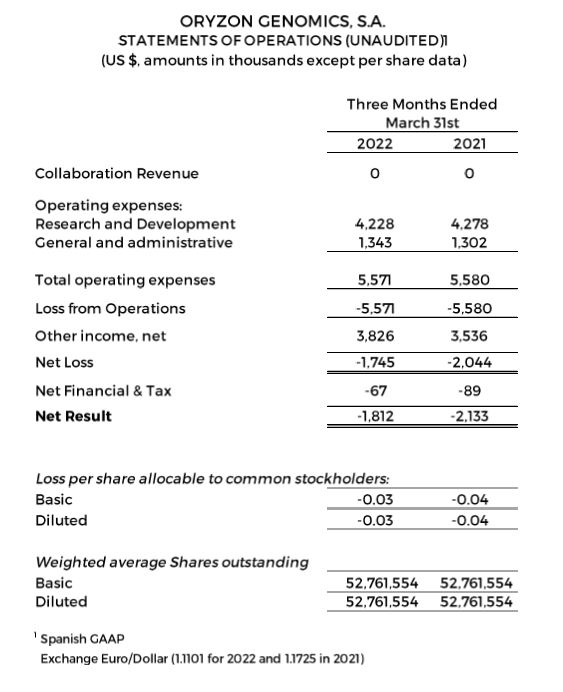Oryzon Genomics, S.A. (ISIN Code: ES0167733015, ORY), a clinical-stage biopharmaceutical company leveraging epigenetics to develop therapies in diseases with strong unmet medical need, today reported financial results for the first quarter of 2022 and provided an update on recent developments.
Dr Carlos Buesa, Oryzon’s Chief Executive Officer, said: “We continued to make strong progress on our clinical pipeline this quarter. In oncology, we obtained approval from the U.S. Food and Drug Administration (FDA) for our Investigational New Drug application (IND) for FRIDA, a Phase Ib trial with iadademstat in combination with gilteritinib in relapsed/refractory acute myeloid leukemia patients harboring a FMS-like tyrosine kinase mutation”.
“In CNS, we also made strong progress. We are actively recruiting patients into the Phase IIb PORTICO trial with vafidemstat in Borderline Personality Disorder (BPD) in the USA, Spain, Germany, Bulgaria and Serbia. Vafidemstat’s Phase IIb trial in schizophrenia, called EVOLUTION, has continued to enroll patients. Furthermore, we are working with the most prestigious key opinion leaders in the space to finalize the design of HOPE, the first randomized Phase I/II personalized medicine trial with an LSD1 inhibitor, in Kabuki Syndrome (KS) patients, which we expect to start in the first half of 2022. Oryzon has further strengthened its presence in the US with the appointment of Douglas V. Faller, MD, PhD as Global Chief Medical Officer, and Dr Ana Limón as SVP in Clinical Development and Global Medical Affairs, both based in Boston. We finished this first quarter with a solid cash position of $28.0 million, which provides funding for further development of our exciting pipeline until 1H2023.”
First Quarter and Recent Highlights
Iadademstat in oncology:
Vafidemstat in large multifactorial CNS indications:
Vafidemstat in monogenic CNS indications:
Financial Update: First Quarter 2022 Financial Results
Research and development (R&D) expenses were $4.2 million for the first quarter ended March 31, 2022, compared to $4.3 million for the first quarter ended March 31, 2021.
General and administrative expenses were $1.3 million for the first quarter ended March 31, 2022, at the same level for the first quarter ended March 31, 2021.
Net losses were $1.7 million for the first quarter ended March 31, 2022, compared to net losses of $2.0 million for the first quarter ended March 31, 2021. The result is as expected, given the biotechnology business model where companies in the development phase typically have a long-term maturation period for products, and do not have recurrent income.
Negative net result of $1.8 million (-$0.03 per share) for the first quarter ended March 31, 2022, compared to a negative net result of $2.1 million (- $0.04 per share) for the first quarter ended March 31, 2021.
Cash, cash equivalents and marketable securities totaled $28.0 million as of March 31, 2022.


Founded in 2000 in Barcelona, Spain, Oryzon (ISIN Code: ES0167733015) is a clinical stage biopharmaceutical company considered as the European leader in epigenetics. Oryzon has one of the strongest portfolios in the field, with two LSD1 inhibitors, iadademstat and vafidemstat, in Phase II clinical trials, and other pipeline assets directed against other epigenetic targets. In addition, Oryzon has a strong platform for biomarker identification and target validation for a variety of malignant and neurological diseases. For more information, visit
Iadademstat (ORY-1001) is a small oral molecule, which acts as a highly selective inhibitor of the epigenetic enzyme LSD1 and has a powerful differentiating effect in hematologic cancers (see Maes et al., Cancer Cell 2018 Mar 12; 33 (3): 495-511.e12.doi: 10.1016 / j.ccell.2018.02.002.). A FiM Phase I/IIa clinical trial with iadademstat in R/R AML patients demonstrated the safety and good tolerability of the drug and preliminary signs of antileukemic activity, including a CRi (see Salamero et al, J Clin Oncol, 2020, 38(36): 4260-4273. doi: 10.1200/JCO.19.03250). In an ongoing Phase IIa trial in elder 1L-AML patients (ALICE trial), iadademstat has shown encouraging safety and efficacy data in combination with azacitidine (see Salamero et al., ASH 2021 poster). The company has recently obtained approval from the U.S. FDA for its IND for FRIDA, a Phase Ib trial of iadademstat plus gilteritinib in patients with relapsed/refractory AML with FLT3 mutations. Beyond hematological cancers, the inhibition of LSD1 has been proposed as a valid therapeutic approach in some solid tumors such as small cell lung cancer (SCLC), neuroendocrine tumors (NET), medulloblastoma and others. In a Phase IIa trial in combination with platinum/etoposide in second line ED-SCLC patients (CLEPSIDRA trial), preliminary activity and safety results have been reported (see Navarro et al., ESMO 2018 poster). New trials in combination in SCLC and NET are under preparation. In total iadademstat has been dosed so far to more than 100 cancer patients in four clinical trials.
Vafidemstat (ORY-2001) is an oral, CNS optimized LSD1 inhibitor. The molecule acts on several levels: it reduces cognitive impairment, including memory loss and neuroinflammation, and at the same time has neuroprotective effects. In animal studies vafidemstat not only restores memory but reduces the exacerbated aggressiveness of SAMP8 mice, a model for accelerated aging and Alzheimer’s disease (AD), to normal levels and also reduces social avoidance and enhances sociability in murine models. In addition, vafidemstat exhibits fast, strong and durable efficacy in several preclinical models of multiple sclerosis (MS). Oryzon has performed two Phase IIa clinical trials in aggressiveness in patients with different psychiatric disorders (REIMAGINE) and in aggressive/agitated patients with moderate or severe AD (REIMAGINE-AD), with positive clinical results reported in both. Additional finalized Phase IIa clinical trials with vafidemstat include the ETHERAL trial in patients with Mild to Moderate AD, where a significant reduction of the inflammatory biomarker YKL40 has been observed after 6 and 12 months of treatment, and the pilot, small scale SATEEN trial in Relapse-Remitting and Secondary Progressive MS, where antiinflammatory activity has also been observed. Vafidemstat has also been tested in a Phase II in severe Covid-19 patients (ESCAPE) assessing the capability of the drug to prevent ARDS, one of the most severe complications of the viral infection, where it showed significant anti-inflammatory effects in severe Covid-19 patients. Currently, vafidemstat is in two Phase IIb trials in borderline personality disorder (PORTICO) and in schizophrenia patients (EVOLUTION). The company is also deploying a CNS precision medicine approach with vafidemstat in genetically-defined patient subpopulations of certain CNS disorders and is preparing a clinical trial in Kabuki Syndrome patients that is expected to start in 1H 2022. The company is also exploring the clinical development of vafidemstat in other neurodevelopmental syndromes.